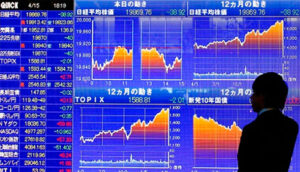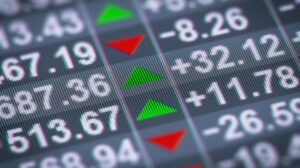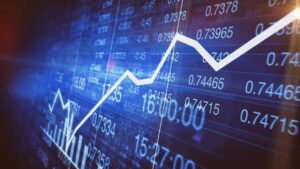
Stock indices of the largest Asia-Pacific countries are declining after the similar dynamics on the US stock market a day earlier.
The important events this week will be the publication of data on changes in consumer prices in the U.S. and China in April. They will be released on Wednesday and Thursday respectively.
China’s Shanghai Composite Index was down 1.4% by 8:36 a.m. and Hong Kong’s Hang Seng was down 0.7%. Both indicators are down for the second consecutive session.
Significant declines in Mainland China were posted by financial sector stocks including China Galaxy Securities (-10%), Bank of China (-5.7%), Agricultural Bank of China (-5.5%), Citic Securities (-3.1%) and ICBC (-4.7%).
On the Hong Kong Stock Exchange, the most significant drop in price was posted by real estate developer Longfor Group Holdings Ltd. – by 3.9% and China Life Insurance Co. (SPB: 2628) by 2.8%.
In addition, computer maker Lenovo went down by 2% as well as Anta Sports Products Ltd. and Li Ning Co. – by 1.9% and 1.8%, respectively.
At the same time, the share price of Internet giant Tencent (SPB: 700) is up 0.5%, retailer Alibaba (SPB: BABA) by 0.9%, carmakers BYD and Geely by 3.7% and 3.6% respectively and chipmakers Sunny Optical Technology Group Co. and Semiconductor Manufacturing International Corp. – by 3.7% and 1.6%, respectively.
The value of Japanese Nikkei 225 index by 8:31 a.m. Moscow timeframe decreased by 0.4 percent.
Among the leaders of falling quotes are shares of metal producers Pacific Metals Co. (-11.2%), Nippon Steel Corp. (-8.2%) and Kobe Steel Ltd. (-3.7%) as well as automobile producer Mitsubishi Motors Corp. (-9.5%).
Moreover, console producer Nintendo (-0.5%) and Sony Group, producing consumer electronics (-0.9%) are also shedding their prices.
South Korea’s Kospi index was down 0.5% by 8:32 MSK.
Shares of the world’s biggest chip and electronics maker Samsung Electronics Co. fell 0.9%, steelmaker Posco – 0.5%.
Meanwhile, stock quotes of Hyundai Motor rose by 2.9%.
Value of Australian S&P/ASX 200 index fell by 0.2%.
Capitalization of the world’s largest mining companies BHP and Rio Tinto declined by 0.2% and 0.8% respectively.
Papers of Australia’s leading wine producer Treasury Wine Estates Ltd. lost 2.1% in price.
Also, following the decline in oil prices, shares of representatives of this industry Woodside Energy and Santos became cheaper – by 0.7% and 1.1% respectively.

Asia-Pacific stock indexes are mostly rising on Friday, the exception is the South Korean indicator.
Traders are assessing the statistical data and the results of the Bank of Japan meeting.
The Japanese Central Bank left unchanged the main parameters of the monetary policy (MP) on the results of the two-day meeting that ended on Friday, which became the first for the new head of the Central Bank Kazuo Ueda.
The short-term interest rate on commercial bank deposits at the Central Bank remained at minus 0.1% per annum, the target yield on ten-year government bonds – about zero, according to a statement from the Japanese Central Bank.
Bank of Japan also retained the range within which the yield of ten-year government bonds may fluctuate – plus/minus 0.5%.
At the same time, the phrase about the Central Bank’s intention to keep the rate at the current level or lower was missing from the text of the statement on the results of the meeting. This is a phrase the Bank of Japan has been repeating since October 2019.
At the same time, the central bank reiterated that it is ready to keep its stimulative policy until inflation stabilizes at the 2% target level.
In addition, the Bank of Japan announced its intention to revise its monetary policy, the results of which will be published in 12-18 months.
Statistics released Friday showed a 13th straight month of improvement in the country’s retail sales, as well as an increase in industrial production and an unexpected jump in unemployment.
Japan’s Nikkei 225 stock index gained 1% in trading. Toyota Motor gained 1.3 percent, SoftBank Group gained 2.3 percent and Denso Corp. – Denso Corp. by 4.3%, Daikin Industries by 2.8% and Ana Holdings by 2.2%.
China’s Shanghai Composite stock index added 0.7 percent in trading Friday, while Hong Kong’s Hang Seng gained 0.6 percent.
The leaders of the growth both in mainland China and Hong Kong are shares of technology companies, rising due to strong quarterly reports of U.S. IT-giants.
Kunlun Tech soared almost 20% in trading in Shenzhen. Shares of BlueFocus Intelligent gained 17%, Dawning Information Industry gained 5.2%, and 360 Security Technology gained 4.8%.
In Hong Kong, shares of BYD Electronic (+6.7%), Haier Smart Home (+5.9%), Semiconductor Manufacturing International (+2%), NetEase Inc. (SPB: NTES) (+3.2%) gained.
The value of China Tourism Duty Free Corp. securities fell 0.15% during trading. The company’s net income fell 10% in the first quarter as its expenses grew faster than revenue.
Australia’s S&P/ASX 200 is adding 0.24% and South Korea’s KOSPI is losing 0.02%.
South Korean industrial production fell 7.6% in March compared to the same month last year. In February the index decreased by 8%.

Stock indices of the largest countries in the Asia-Pacific region on Friday declined after the negative dynamics of the U.S. stock market.
Consumer prices in Japan rose 3.2 percent year on year in March, according to the country’s Ministry of Internal Affairs and Communications. Thus, inflation slowed down from February’s 3.3% and was the lowest since September 2022.
Consumer prices in Japan, excluding fresh food (a key indicator tracked by the country’s central bank), rose 3.1% in March compared with the same month a year earlier. That matched both the February figure and analysts’ average forecast, Trading Economics reported.
Meanwhile, inflation excluding food and energy increased to 3.8% from 3.5%.
Japan’s Nikkei 225 index was down 0.25% by 8:30 a.m. ET.
Shares of carmakers Nissan Motor Co. (-3.3%) and Mazda Motor (-2.5%) and Internet company Rakuten (-2.6%) were among the leaders of the fall.
In addition, members of the financial industry are getting cheaper, including Mizuho Financial Group Inc. – by 2.3%, SoftBank Group, Dai-ichi Life Holdings Inc. and Mitsubishi UFJ Financial Group Inc. – by 2.1 percent.
Meanwhile, Tokyo Gas Co. (+5.3%), chip maker Advantest Corp. (+3.6%), transportation firm Kawasaki Kisen Kaisha Ltd. (+1.8%) and retailer J. Front Retailing Co. (+1.8%).
China’s Shanghai Composite had fallen 1.4 percent by 8:35 a.m. QE, marking its third straight negative session.
Hong Kong’s Hang Seng index is losing about 1.2%, also due to a decline in the technology sector.
Among them, shares of chipmakers Semiconductor Manufacturing International Corp. and Sunny Optical Technology Group Co. – by 4.1% and 2.9%, respectively, aluminum producer China Hongqiao Group by 4.5%, retailer Alibaba (SPB: BABA) by 3.5%, insurer Ping An Insurance by 3.2% and consumer electronics maker Xiaomi (SPB: 1810) by 2.8%.
South Korea’s Kospi index was down 0.75% by 8:31 a.m. ET.
Shares of steelmaker Posco plummeted 5.9%, automaker Hyundai Motor – 1.3%.
At the same time, the share price of Samsung Electronics Co., one of the world’s largest chip and electronics manufacturers, rose 0.3%.
Australia’s S&P/ASX 200 index was down 0.3 percent by 8:31 a.m. ET.
The capitalization of the world’s largest mining companies BHP and Rio Tinto are down 2.5% and 3.5%, respectively.
Rio Tinto in the first quarter decreased its iron ore shipments by 6% compared to the previous three months and diamond production by 28%. The company cut its 2023 copper output forecast to 590,000-640,000 tons from the previously expected 650,000-710,000 tons.

Stock indices of major Asia-Pacific countries are rising in trading on Friday, with bourses in Australia and Hong Kong not working due to the Easter holiday.
Japan’s Nikkei 225 index was up 0.2 percent by 8:42 a.m.
Shares of optical equipment maker Hoya Corp. (+2.4%), chipmaker Tokyo Electron Ltd. (+1.9%), insurer Dai-ichi Life Holdings Inc. (+1.9%) and automaker Mazda Motor (+1.9%) were among the leaders.
Meanwhile, Seven & I Holdings gained 4%. One of the largest trading companies in the world increased its net profit and revenues by about a third last fiscal year, which ended in February. However, the outlook for this fiscal year disappointed investors. The company expects its operating profit to be 513 billion yen ($3.9 billion) while analysts forecast an average of 526 billion yen.
China’s Shanghai Composite Index was up 0.3 percent by 8:47 a.m. Since the beginning of this week, it has added 1.4%, and it ends “in plus” for the fourth week in a row, said Trading Economics.
Shares of pharmaceutical companies Shouyao Beijing (+20%), Suzhou Zelgen Biopharmaceuticals (+14.8%) and Dizal Jiangsu Pharmaceutical (+11.4%) demonstrated considerable growth.
South Korea’s Kospi Index was up 1.3% by 8:40 a.m.
One of the world’s biggest chip and electronics maker Samsung Electronics Co. gained 4.5% and steelmaker Posco rose 1.4%.
At the same time, shares of automaker Hyundai Motor fell 0.2%.

Stock indices of Asia-Pacific region (APR) countries do not show unified dynamics during Monday morning trading.
Investors are estimating the statistical data from Japan and news on additional reduction of oil production by some OPEC+ countries.
As it was reported the night before 8 out of 20 OPEC+ countries announced about a voluntary reduction of oil production from May till the end of the year. According to Interfax calculations, the total reduction of oil production will amount to about 1.657 mln bpd, of which the Russian Federation and Saudi Arabia will account for 500 thousand bpd each.
Oil prices jumped up about 5% on this news. Traders are concerned that this decision may increase inflationary pressures in the world, complicating the task of central banks to return inflation to target levels, writes Trading Economics.
The U.S. authorities have already called the decision inappropriate.
Hong Kong’s Hang Seng indicator lost 0.6%. Prior to that, the index was rising four sessions in a row and ended trading on Friday at a three-week high.
Sino Biopharmaceutical (-8.2%), Wuxi Biologics (-3.9%) and Baidu Inc. (-3.4%) showed the most noticeable drops.
China’s Shanghai Composite stock index gained 0.55%.
Energy stocks were rising after a rebound in oil prices. Cnooc Ltd. gained 4.8%, Petrochina gained 1.7% and Guanghui Energy gained 2.3%. Tech stocks, including East Money Information (9.8%), 360 Security Technology (4.8%) and iFLYTEK (4%) also rose.
Japan’s Nikkei 225 index was up 0.5 percent.
As it became known on Monday, the Tankan index, which assesses the level of confidence in Japan’s economy among large companies in the processing industry, fell to 1 point in January-March from 7 points a quarter earlier.
The value of the indicator was the lowest since the fourth quarter of 2020 and failed to meet the forecasts of experts who expected a drop to 3 points.
The leaders of the decline in the Nikkei Index are shares of energy and financial companies. The price of Inpex Corp shares rose by 5.2%, Eneos Holdings – by 2.4%, Mitsubishi UFJ – by 1.2%, Sumitomo Mitsui – by 1.4%.
South Korea’s Kospi index declined 0.3%.
The market value of one of the world’s largest chip maker Samsung Electronics Co. fell by 1.6% and automaker Hyundai Motor – by 0.5%.
Australia’s S&P/ASX 200 index added 0.5%.
Retail sales in Australia rose 0.2% in February versus January, when the figure jumped 1.8%, final data showed Monday.
The rise in oil prices pushed up shares of Australian oil and gas companies Woodside Energy (5.3%), Santos (4.8%), Beach Energy (7.1%), Karoon Energy (7.9%) and Ampol (2%).
The market value of mining concern BHP Group rose 0.3%, Commonwealth Bank rose 0.6%, and coal producer Whitehaven Coal rose 3.7%.

Asia-Pacific stock indices rose on Tuesday, recovering from declines in previous sessions after Wall Street and European markets.
U.S. main indices were up 0.4-1.2%, while the Stoxx Europe 600 composite added 1% on the news that Swiss bank UBS is buying distressed Credit Suisse for 3bn Swiss francs ($3.25bn).
The key event of the week will be the meeting of the Federal Reserve System. Analysts and market participants generally believe that due to the tense situation in the banking sector, the Federal Reserve may raise the prime rate by only 25 basis points. At the same time many economists admit the probability that the rate will be kept at the same level.
China’s Shanghai Composite stock index rose 0.5%.
Shares of Kunlun Tech (10.7%), Zhonghang Electron (6%), Inspur Electronic (1.3%), Wuxi Apptec (5.4%) and Changchun High New (6.7%) showed the most notable gains.
Hong Kong Hang Seng indicator added 0.9%.
Healthcare and consumer sector stocks were the growth leaders. Wuxi Biologics gained 7.3%, Li Ning gained 5.2%, Chow Tai Fook Jewelry gained 4.4% and AIA Group gained 2.8%.
Shares of Bilibili Inc. jumped more than 9% on news that Chinese regulators had issued licenses to sell 27 foreign video games in the country. Bilibili will be the distributor for some of them.
South Korea’s Kospi index rose 0.4%.
The market value of one of the world’s largest chip makers Samsung Electronics Co. rose 0.3% and automaker Hyundai Motor rose 0.2%.
Australia’s S&P/ASX 200 index rose 0.8 percent.
The minutes of the March meeting of the Australian Central Bank, released on Tuesday, showed that the regulator’s leadership is ready to consider a pause in the cycle of rising rates at the next meeting.
Shares of Australia’s leading banks Macquarie Group, Commonwealth Bank, ANZ Group, Westpac Banking and NAB rose 1.3-2.7%.
Major mining and energy companies, including BHP Group (1.9%), Pilbara Minerals (3.6%), Whitehaven Coal (3.5%) and Woodside Energy (1.8%) also rose.
Japan’s stock exchanges are closed Tuesday in observance of Vernal Equinox Day.